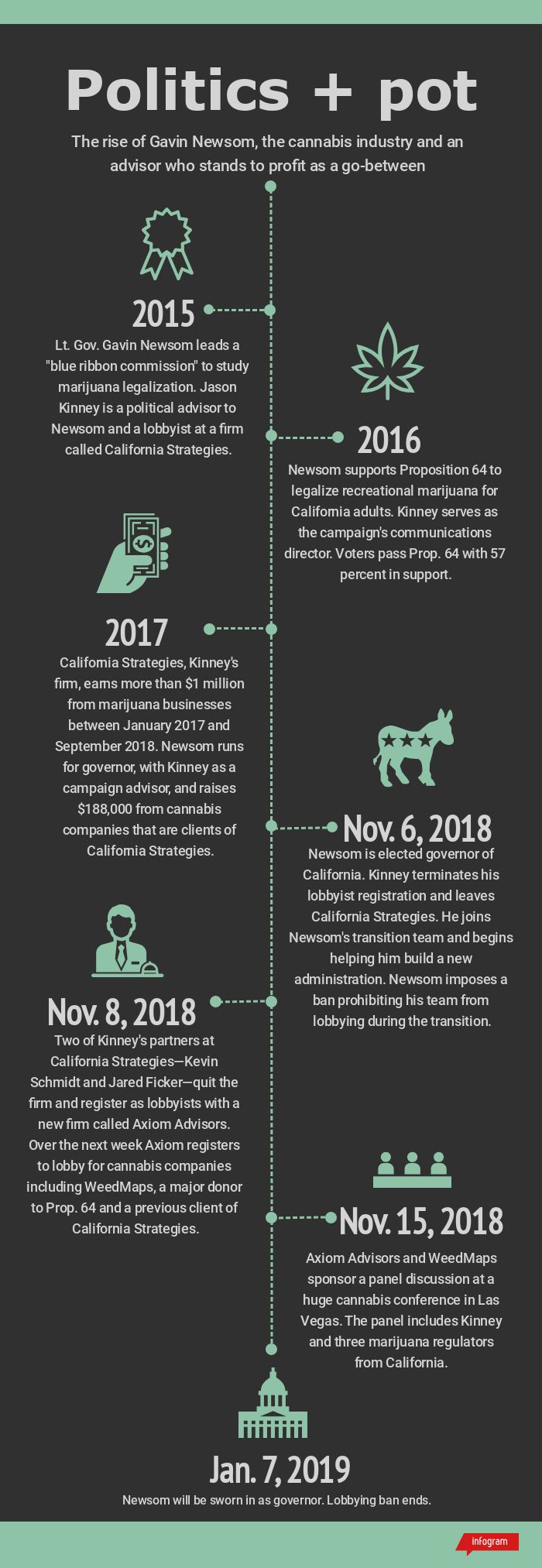It would be one more step through the revolving door for Kinney, who has made a lucrative and powerful career in Sacramento by moving from government to campaigns to industry lobbyist.
This time, the question is whether he is working for an incoming administration that he will soon seek to influence.
“Who is he really serving?” asked Jessica Levinson, a professor at Loyola Law School and former president of the Los Angeles Ethics Commission. “Is he a hired gun for the marijuana industry? Is he a public servant working on a gubernatorial transition? The answer very likely is all of the above. The question is … can he do all of those things at the same time without raising a potential conflict of interest.”
Kinney told CALmatters that his appearance at the pot industry conference “was routine, appropriate and not in conflict with my work on the transition.” He added that he has “made no decisions about my professional future beyond Jan. 7,” when Newsom is sworn in.
Schmidt said that as far as he knows, Kinney is focused on the transition and hasn’t decided what will come next. Neither of them ruled out the possibility that Kinney could join Axiom.
Nathan Click, a Newsom spokesman, said the governor-elect has imposed a “lobbying ban,” and that “those working on the transition have agreed to not lobby transition staff, as defined under the Political Reform Act.” The act refers only to people who are paid more than $2,000 a month, or spend more than a third of their time, trying to influence government decisions. And the ban ends the day Newsom becomes governor.

Newsom told CALmatters that Kinney’s role in the transition is informal, taking calls from people who want to connect with the governor-elect and recommending potential job candidates. When asked about their relationship, Newsom said he would draw the line between business and friendship.
“I always separate,” Newsom said. “I have 20-plus years of separating those kinds of things.”
Until early November, Kinney and Schmidt were lobbyists for a high-powered firm called California Strategies. Kinney—a longtime political adviser to Newsom—also was the communications director for Proposition 64, the 2016 marijuana initiative Newsom championed.
Since it passed, California Strategies has reaped more than $1 million from cannabis clients—investment companies, tech platforms and growers seeking to influence the rules for California’s marijuana marketplace. California Strategies’ cannabis clients donated at least $188,000 to Newsom’s campaign, a chunk of the more than $500,000 he raised from marijuana businesses overall.
Like any big-money industry, cannabis businesses are lobbying for laws and regulations to help them succeed. The next governor could shape the potentially lucrative marketplace based on who he appoints to oversee regulations, or whether he signs laws to, for example, decrease taxes on marijuana or create a cannabis-friendly state bank allowing an alternative for what is now an all-cash industry. Rules nearing final approval already are generating complaints from small farms and cities that they favor large growers and cannabis delivery companies.
“Kinney and his colleagues and their clients seem to have a more direct line of communication to Mr. Newsom, and that’s really concerning for a lot of the small businesses that don’t have the resources to have those types of representatives,” said Hezekiah Allen, who chairs a farming co-op called Emerald Grown.
“The general sense out there in the community is, ‘Darn, the incoming governor isn’t going to listen to us. There’s this gatekeeper, and it’s a pay to play system.’ ”
Newsom has long promoted the idea that marijuana legalization is not just a business opportunity, but a righteous cause. He’s embraced decriminalization policies that offer a second chance to black and brown Californians who were disproportionately harmed by the war on drugs. A panel he led to study model pot policy declared in 2015 that it “should not be California’s next Gold Rush.”
And in 2017, as he raised money for his gubernatorial campaign at the Hollywood Hills home of a cannabis executive, Newsom said he wants “to make sure our diverse communities are front and center in this conversation, and that we’re protecting our small growers.”
The host—the CEO of Advanced Nutrients, which makes fertilizers for marijuana plants—later boasted that the event raised $140,000 for Newsom in 90 minutes. His company also has been one of California Strategies’ most lucrative clients since voters passed Proposition 64.
A one-time speechwriter for Gov. Gray Davis, Kinney rose to a partnership at California Strategies by working with both elected officials and the corporations that seek to influence them. He has been a strategist for Newsom and Democrats in the state Senate while also being paid by corporate clients, including AT&T and PhRMA.
In the cottage industry that is Capitol policymaking, this is not unheard of. Sacramento has a vast ecosystem of fixers and consultants who wield influence—some are lobbyists who represent businesses or unions, others are strategists or consultants who work for politicians. A powerful handful have figured out how to do both.
Kinney has run into occasional trouble walking that line. He was forced to register as a lobbyist in 2013, when he was fined by the state’s political watchdog for hiding his work to sway government decisions. Kinney acknowledged at the time that he broke state law by not formally registering and disclosing who was paying him.
Registered lobbyists must take annual ethics classes, post their photos on the secretary of state’s website and publicly disclose who’s paying them and how much. They are banned from giving campaign contributions to candidates for state office. Consultants who don’t register as lobbyists face none of those rules.
Kinney also failed to properly register as a foreign agent when he was hired in October 2008 to lead a publicity campaign for an exiled sheik seeking to regain power in an obscure Arab kingdom. The eight months it took him to comply with federal law allowed him and his wife to contribute $52,000 to President Barack Obama’s inauguration, a prime networking event that banned contributions from foreign agents.
Since he left California Strategies on Nov. 6 Kinney says he’s been volunteering full time for Newsom’s transition. Like the rest of the transition team, he’s using an “@gavinnewsom.com” email address. Kinney says the email is for official transition business. It’s also a symbol of his proximity to the governor-elect.
Lobbyists and other influencers rise and fall with each change of political power in Sacramento. After Gov. Gray Davis took office, his campaign fundraiser, Darius Anderson, opened a lobbying shop and enjoyed enormous clout until Davis was recalled.
Then, during the Schwarzenegger administration, California Strategies gained influence—its founder, Bob White, had chaired the movie star’s gubernatorial campaign. The firm has expanded to include a bipartisan staff of former government officials, and brought in $4.5 million in the first nine months of 2018, making it the third-highest earning lobbying firm in the state.
But legal weed, and the money to be made from it, is a special wrinkle. Not since the rise of tribal gambling during the Davis administration has a new industry so closely coincided with the rise of a new governor.
Several in the cannabis industry who attended the Las Vegas conference saw Kinney’s presence there as a subtle sales pitch for the access he and Axiom could have to Newsom’s administration. Not wanting to anger the incoming governor, however, they spoke on condition of anonymity.
“It certainly gave him the opportunity,” one entrepreneur said, “to promote the firm and himself.”
CALmatters senior editor Dan Morain contributed to this report.


